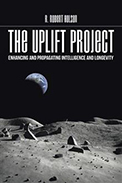
 |
The designer/author of The Uplift Project, Robert Holson, has been an overseas aid worker, a neuroscience researcher, and a professor of psychology. This collection of scientific essays promotes his conviction that human beings can, in the span of the next 1,000 years, markedly increase their intelligence and lifespan. He sets a goal of an average IQ of 145 points (the current mean IQ is 100 points) and a lifespan of 100 years (currently the highest average longevity is 85 years). He bases his theory on varied data—American lifespan increased from 50.2 to 76.2 from 1910 to 2010, for example, and there is a verifiable relationship between IQ and longevity. Holson advocates raising IQ and longevity in mammals that already have a long life expectancy like whales and canines. He envisions a time when specially “uplifted” humans—their IQ and lifespan bolstered by the use of artificial genetic interventions, their family size limited to two parents and two children (one artificially engendered and one natural)—will colonize space stations or other planets. He also speculates that machines like robots can be “uplifted” to serve humans more efficiently.
Holson’s ground-breaking proposal deserves consideration, even by those who may not feel comfortable with every aspect of his vision. He has tried to consider all possible angles of his projected utopia: how to sustain food supply, the use of drugs to enhance health (he says “yes” to caffeine and nicotine in pill form) and even the notion that siblings might fight about which one is the more “natural.” He writes with competence and confidence, although his book is weighty with footnotes. One chapter has thirty pages worth, another has ten, and other chapters are interrupted by lengthy citations within paragraphs, making a smooth read difficult. But overall, his are ideas worth studying. For armchair future planners and sci-fi/sci-fact dreamers, The Uplift Project offers fascinating theories that, in whole or in part, could someday be brought to fruition.
RECOMMENDED by the US Review